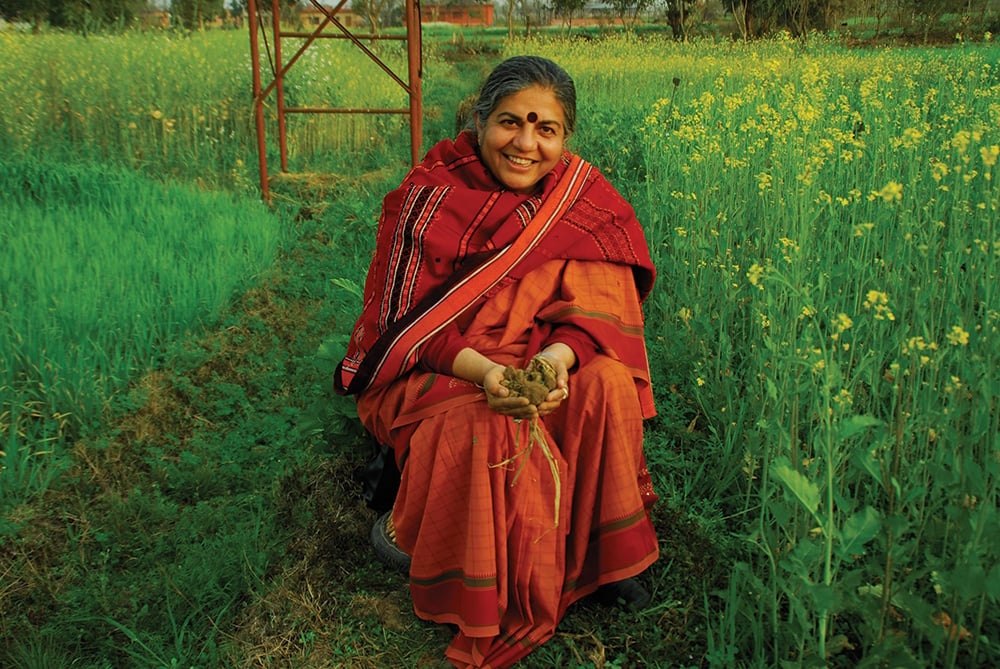The pandemic has forced the Indian Summer Festival — “Where Worlds Meet” — online this year, with events planned throughout the coming weeks.
One of the first is a discussion between India-based environmental and agricultural activist Vandana Shiva and Canada’s David Suzuki titled The Virus is a Wake-up Call on Saturday at 7 p.m.
The two will talk about what the global pandemic has wrought and what this moment in time might offer in terms of possible futures for the planet and its inhabitants. Their conversation will be available on both Facebook and YouTube.
The Tyee talked with Shiva about present and future worlds. (This interview has been lightly edited for length and clarity.)
The Tyee: Arundhati Roy wrote in a recent essay that “Historically, pandemics have forced humans to break with the past and imagine their world anew. This one is no different. It is a portal, a gateway between one world and the next. We can choose to walk through it, dragging the carcasses of our prejudice and hatred, our avarice, our data banks and dead ideas, our dead rivers and smoky skies behind us. Or we can walk through lightly, with little luggage, ready to imagine another world. And ready to fight for it.”
Do you think people are ready to imagine a different way of living?
Vandana Shiva: The future will not be like the past. There is, of course, the ecological issue of slowing down to lighten our footprint. But there are other futures unfolding. Firstly, because the lockdown has resulted in so many people losing their livelihoods.
According to the International Labour Organization, of the world’s 3.3 billion working people, 1.9 billion will have lost their livelihood base. Unfortunately, I’m watching a new class of throw-away people being deliberately created, not by the virus but by the inhuman implementation of lockdown. Further, there is another future being planned by big tech, based on surveillance and control.
I write about this in my latest blog post.
In previous interviews, you’ve spoken about 2019 being a pivotal year with different communities around the world demanding a new way of being. What do you foresee happening to this global demand given everything that has taken place in recent months?
If we avoid brutalization and division, indifference and separation, we can still evolve the potential to work together as one humanity on one planet.
You’ve made the argument that diet, pollution and systemic inequality have laid the groundwork for the virus to rage through certain populations. In the U.S., the people who are most susceptible to COVID-19 are being blamed for the spiralling rates of death. Is it possible to address the pandemic without also looking at these underlying conditions?
Across the world the data is clear. Chronic diseases largely linked to industrial, chemical food amplify the mortality related to COVID-19. So, we cannot address this COVID emergency without addressing the health emergency as a whole.
An article in the Guardian quoted historian Roxanne Dunbar-Ortiz: “The capitalist class, those who benefit most from the unequal system, they know it’s not sustainable.... They’re desperate not to stay locked down too long, so people get used to fresh air, breathing air without carbon in it. People might get ideas of a different kind of world.”
Do you think this period of lockdown has opened up a window to see a new kind of future?
As I mentioned, the tech billionaires are already shaping a new kind of future during lockdown. The challenge we face as humanity is imagining futures that are free of the fossil fuel corporations, the poison cartel that has shaped industrial agriculture and spread the chronic disease pandemic, and the tech giants who are the new billionaires trying to shape our future. I have called this the money machine. We have a future if we can reimagine and reclaim our life and freedom from the money machine.
What are the most immediate and tangible means that people can use to make change in their own lives and that of their communities?
We are food. We are connected through food. The web of life is a food web. Food is the currency of life. The tech giants have joined hands with the poison cartel to feed us fake lab food in the future, using the corona lockdown crisis that has ruptured supply chains. Food determines our health. Do not internalize the “war against microbes” worldview being created.
Our gut has 60 trillion microbes that make us and our health. Remember we are walking microbes. Our health is a continuum through biodiversity in the food web, from the soil, to plants to our gut. Grow your food, know your food. Is it real or fake? Know your farmer. Create a food community. Sow your freedom. ![]()
Read more: Health, Coronavirus, Environment
















Tyee Commenting Guidelines
Comments that violate guidelines risk being deleted, and violations may result in a temporary or permanent user ban. Maintain the spirit of good conversation to stay in the discussion.
*Please note The Tyee is not a forum for spreading misinformation about COVID-19, denying its existence or minimizing its risk to public health.
Do:
Do not: